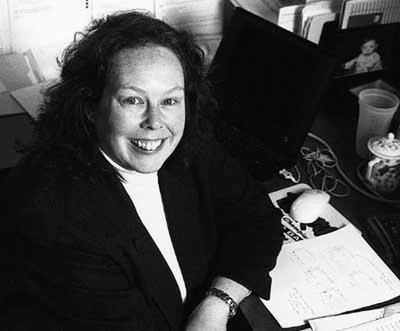December 6, 2001
Disis continues work to develop a vaccine for breast cancer recurrence
By Pamela Wyngate
HS News & Community Relations
Of women diagnosed with invasive breast cancer, 30 percent will develop a recurrence within five years. Eighty percent of women treated for ovarian cancer relapse after the first treatment. To prevent cancer recurrence, the UW Tumor Vaccine Group, directed by Dr. Mary L. “Nora” Disis, associate professor of medicine in the Division of Oncology, researches how to boost the immune system in cancer patients. Disis, who is also an associate member of the Fred Hutchinson Cancer Research Center, has had success with a cancer vaccine.
“Several years ago our group started trying to figure out whether cancer patients could develop an immune response against their tumors,” says Disis.
What she and other tumor immunologists found was that there are proteins in cancer tumors that can stimulate immune responses. These proteins are immunogenic in cancer patients, but cancer-free people have no immune response to them.
Disis focused her group on cancer patients’ immune response to a protein called HER-2/neu, a growth factor receptor that is over-expressed in 20 to 30 percent of breast cancers and in 10 to 15 percent of ovarian cancers. HER-2/neu is thought to be one of the initiating factors in these types of cancers.
“Presumably when you have HER-2/neu present on the surface of the cells, the cells keep getting the signal to grow and divide,” she says. “HER-2/neu is a normal growth factor receptor expressed on a lot of the cells in our body, but in cancerous cells the gene becomes amplified, and the protein is over-expressed.”
According to Disis’ studies, cancer patients have what amounts to a low-level immune response to HER-2/neu.
“These patients’ immune response to HER-2/neu wasn’t low because their immune systems were non-functional,” she says. “In fact you could give these people tetanus shots and they would develop the same level of tetanus immunity as you or I would. So clearly their immune systems just were not making a rip-roaring immune response against HER-2/neu.”
HER-2/neu is a normal cellular protein that the body recognizes as “self,” not like a “foreign” virus protein. One of the major mechanisms by which tumors may escape immune recognition is tolerance. Cancer grows out of control and is totally aberrant, but it is not foreign enough that the immune system purges it from the body.
To circumvent tolerance and make HER-2/neu “look” more dangerous to the immune system, Disis and her colleagues conducted multiple experiments to stimulate immunity to self-proteins. One of the most efficient strategies they found was using computer modeling systems to select fragments of the protein that would potentially be the most immunogenic.
“If you present these protein fragments, called peptide epitopes, to the immune system, they can generate an immune response,” says Disis. “In animal models when we identified these peptide epitopes, rats developed a great response to rat neu. ”
From the animal models Disis extrapolated and developed similar fragment or peptide-based vaccines for humans. Over 60 patients who had completed treatment for breast or ovarian cancer were immunized with the vaccine multiple times over a six-month period. Using a model similar to infectious disease, women who still had active cancer were not vaccinated. Patients in the study had cancer, so the researchers had their tumors and could test for HER-2/neu antigens.
“We’ve had patients now four or five years out of vaccination who continue to maintain some vigorous immunity,” says Disis. “This study showed us that cancer patients can be immunized and these immune responses can persist. In the long run we’d like to produce a vaccine that would immunize against several of the most common proteins expressed in malignant tumors-just like when you get a flu shot, you are vaccinated against multiple different strains of flu.”
Disis presents the Science in Medicine lecture “Cancer Vaccines Targeting Solid Tumors,” at noon, Thursday,
Dec. 13, in Turner Auditorium (Room D-209) of the Health Sciences Center.
Disis earned a M.S. in immunology and a M.D. in 1986 at the University of Nebraska, Omaha. She completed her internship and was chief resident in internal medicine at the University of Illinois in Chicago. She came to the UW in 1990 as a senior fellow in oncology.

